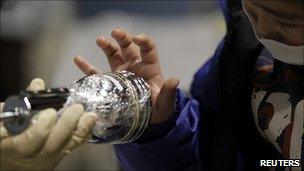Japan nuclear crisis: Sarkozy calls for global rules
- Published

French President Nicolas Sarkozy has called for clear international standards on nuclear safety in light of the ongoing crisis at Japan's Fukushima Daiichi nuclear plant.
Speaking in Japan, he proposed that nuclear safety authorities from the G20 countries discuss the issue in May.
Radiation detected in the sea near the stricken plant has again risen steeply.
Meanwhile, the UN has advised Japan to consider expanding the evacuation zone around the reactors.
Mr Sarkozy is the first foreign leader to visit Japan following the earthquake and tsunami that hit the country on 11 March.
The disaster has so far claimed more than 11,000 lives, with at least 16,000 people still reported missing.
The French president said he wanted to see international standards on nuclear energy established by the end of the year, and that France would ask G20 nuclear delegates to lay the groundwork for a special meeting of the International Atomic Energy Agency (IAEA) in June.
"The problem is more about establishing safety norms than it is about the choice of nuclear energy, for this there is no alternative right now," Mr Sarkozy was quoted as saying by Reuters.
"We must address this anomaly that there are no international safety norms for nuclear matters. We want international standards because the world is a village and what happens in Japan can have consequences elsewhere."
Evacuation zone advice
The IAEA has nuclear standards, but they are not binding.
France is more dependent on nuclear power than any other country, using it to meet about 75% of its domestic needs.
French nuclear reactor maker Areva has been offering the Japanese help with containing contaminated water.
UN nuclear monitors advised Japan to consider widening the 20km (12-mile) evacuation zone around the Fukushima Daiichi plant after the IAEA found safe radiation limits had been exceeded at the village of Iitate, 40km north-west of the nuclear plant.
But Yoshihiro Sugiyama, a nuclear safety agency official, said there were no plans to increase the size of the zone.
"At the moment, we do not have the understanding that it is necessary to evacuate residents there," he said. "We think the residents can stay calm."
The village mayor was quoted as saying he was "very worried" about the IAEA warning. "But the government immediately informed us that there is no immediate harm to human health, so I was relieved," he added.
Contaminated seawater
A government spokesman said authorities would "continue monitoring the level of radiation with heightened vigilance" and "take action if necessary."
The BBC's Roland Buerk reports on how one town's sea wall helped protect its residents
Radioactive iodine levels in seawater near the plant reached a new record - 4,385 times the limit.
Radioactive material may be leaking from the damaged plant continuously, the country's nuclear and industrial safety agency (Nisa) said.
Workers are continuing to try to stabilise four reactors by using water to cool fuel rods. They also face the problem of how to deal with highly radioactive run-off water that has accumulated in a tunnel.
Kyodo reported that the radiation level in a tunnel outside Reactor 2 was more than 10,000 times above normal levels.
The plant's operator, Tokyo Electric Power (Tepco), announced on Wednesday that the four stricken reactors would be decommissioned.
The US and UK earlier advised their citizens in Japan to keep at least 80km from the plant.
The US is to send a 140-member radiation control team to assist Japanese authorities, Kyodo News agency quoted Japan's military chief, General Ryoichi Oriki, as saying.